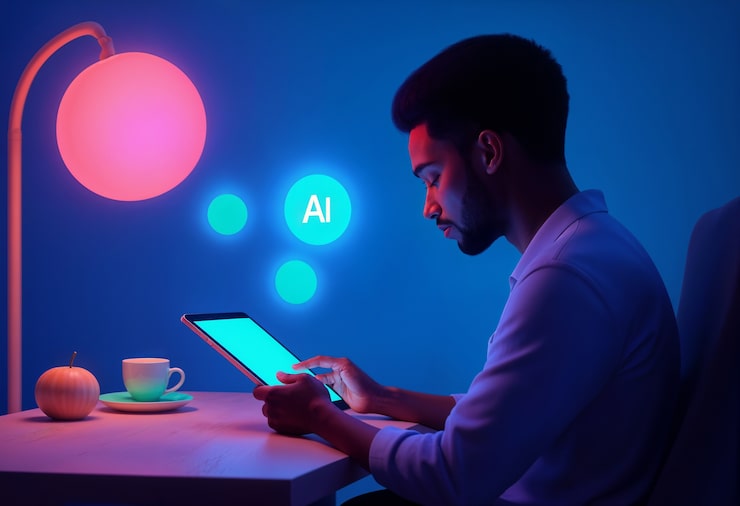AI in digital marketing has rapidly shifted from being a futuristic concept to becoming the backbone of today’s online business strategies. Every time you see a personalized ad on social media, a chatbot answering questions on a website, or product recommendations on an e-commerce store, artificial intelligence is quietly working behind the scenes.
The world of marketing has always been about reaching the right audience with the right message. What has changed is the speed, accuracy, and creativity with which AI makes this possible.
The Role of AI in Digital Marketing Today
Modern consumers expect brands to understand them better than ever. With millions of interactions happening daily, no human marketer can analyze all that data quickly. This is where AI in digital marketing steps in. AI tools can track consumer behavior, predict what they might like, and suggest the most effective way to engage.
For example, Netflix’s recommendation engine analyzes viewing habits to suggest shows, while Amazon’s AI-driven product suggestions generate billions in revenue each year. These are not just technological achievements but living examples of how AI transforms the customer journey.
Smarter Customer Engagement with AI
One of the most visible uses of AI is in customer service. Chatbots powered by AI provide instant responses, reducing waiting times and improving satisfaction. They don’t just answer basic questions but also learn from past interactions, making each conversation smarter.
Imagine a customer landing on a fashion website looking for winter jackets. Instead of browsing hundreds of items, an AI chatbot narrows options based on size, budget, and preferences, delivering a smooth shopping experience. That level of personalization was almost impossible a decade ago.
AI in Digital Marketing for Content Creation
Content remains the king of digital marketing, but creating it consistently is a challenge. AI is now assisting marketers in generating blog drafts, video captions, and even design ideas. Tools powered by AI analyze trends and suggest topics that are more likely to attract attention.
This doesn’t replace human creativity but enhances it. A copywriter, for instance, may use AI to analyze which headlines have the highest chance of driving clicks, then craft compelling stories around those insights. This partnership between human creativity and machine intelligence is shaping the future of online content.
Predictive Analytics and Smarter Campaigns
Marketing used to involve trial and error, but predictive analytics powered by AI has changed the game. Instead of guessing, brands can now rely on algorithms that forecast consumer actions.
An online store, for instance, can predict which users are about to abandon their carts and offer them instant discounts to encourage checkout. Similarly, an email campaign can be optimized to reach users at the exact time they are most likely to open messages.
By reducing wasted ad spend and increasing conversion rates, predictive AI tools are becoming indispensable in digital marketing.
Personalization at Scale
In the past, personalization meant adding a customer’s name to an email. Today, AI in digital marketing makes it possible to deliver tailored experiences to millions of people at once.
Streaming platforms suggest playlists unique to each listener, while online stores create personalized homepages for returning visitors. This ability to make every interaction feel one-on-one is one of the strongest advantages AI brings to marketers.
It’s not just about selling products but about creating emotional connections. When a customer feels that a brand understands them, loyalty grows naturally.
AI and Social Media Marketing
Social media is a fast-moving environment where trends change in hours. AI helps marketers stay ahead by analyzing massive amounts of data from platforms like Instagram, TikTok, and Twitter.
Brands use AI tools to monitor conversations, identify influencers, and predict which posts will go viral. For example, Coca-Cola uses AI-driven sentiment analysis to track how people respond to its campaigns in real time, allowing instant adjustments when needed.
This agility gives brands a competitive edge in spaces where consumer attention is fleeting.
Voice Search and AI-Driven SEO
With smart assistants like Alexa, Siri, and Google Assistant becoming common, voice search is transforming how people find information. AI helps optimize content for conversational queries, ensuring brands remain visible in this new search landscape.
Instead of typing “best pizza near me,” people now ask, “Which pizza place is open right now?” AI-driven SEO ensures that businesses adapt their content and keyword strategies to match this natural speech pattern.
For marketers, this means a fresh wave of opportunities to connect with audiences in their everyday moments.
The Ethical Side of AI in Marketing
As exciting as these innovations are, there are also concerns. Using customer data responsibly is one of the biggest challenges. AI systems rely heavily on data, and if not managed carefully, privacy can be compromised.
Marketers need to be transparent about how they use data and ensure that personalization never feels invasive. Striking the balance between helpful and intrusive is the key to long-term trust.
Future of AI in Digital Marketing
Looking ahead, the influence of AI will only deepen. Augmented reality ads, hyper-personalized campaigns, and real-time strategy adjustments will become the norm. The brands that succeed will be the ones that embrace AI while keeping the human touch alive.
At its core, marketing is still about building relationships. AI provides the tools to do that faster, smarter, and more effectively than ever before.
Read also:

